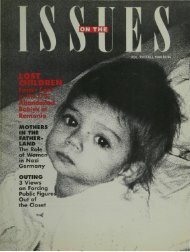I Am Beautiful: A Celebration of Women in Their Own Words
I Am Beautiful: A Celebration of Women in Their Own Words
I Am Beautiful: A Celebration of Women in Their Own Words
You also want an ePaper? Increase the reach of your titles
YUMPU automatically turns print PDFs into web optimized ePapers that Google loves.
Desperate Measures:A mother battles a sick systemby Kather<strong>in</strong>e Eban F<strong>in</strong>kelste<strong>in</strong>"Don't judge me by my house," saysKathryn Myrice, 42, <strong>in</strong> the airless clutter<strong>of</strong> her clapboard home on the edge <strong>of</strong>Ohio farm country. In the summer-baked<strong>in</strong>terior, we w<strong>in</strong>d through an obstaclecourse <strong>of</strong> illness. The small frontentrance hall has been converted <strong>in</strong>to asick room, where her 19-year-old son,Chad, lies <strong>in</strong> a hospital bed. Light burnsthrough the small screen w<strong>in</strong>dows. Acool wash cloth covers his face, which isswollen from medication.Kathryn, cop<strong>in</strong>g with her son's fastmov<strong>in</strong>gbra<strong>in</strong> tumor, leads me <strong>in</strong>to herkitchen. At the table, amid strewnashtrays and stacks <strong>of</strong> medical records,sit three generations <strong>of</strong> family with nomedical <strong>in</strong>surance: her sister, Julie,wheelchair-bound (years ago, she wasshot by a jealous boyfriend); Kathryn'steenage daughter, Tonya, feed<strong>in</strong>g herbaby son, Just<strong>in</strong>, perched <strong>in</strong> a high chair.Chad hollers out, "Mom," and Kathryngets up. "Hav<strong>in</strong>g a bra<strong>in</strong> tumor doesn'taffect your lungs," she says, her blue eyeslight<strong>in</strong>g up beh<strong>in</strong>d p<strong>in</strong>k glasses, herstenciled eyebrows ris<strong>in</strong>g. After giv<strong>in</strong>g herson a fresh washcloth, she returns to thetable. "I don't care if there are disastersstacked up to the ceil<strong>in</strong>g," she says. "Ihave one function <strong>in</strong> this world right now,which is to take care <strong>of</strong> my son."Despite her fortitude and good humor,Kathryn is, <strong>in</strong> fact, desperate. Her son isdy<strong>in</strong>g and neither <strong>of</strong> them has health<strong>in</strong>surance. She forages constantly forcompassionate doctors, negotiatesresources and does end runs around anunresponsive system.Kathryn Myrice's predicament is onesmall ripple <strong>in</strong> a deepen<strong>in</strong>g nationalcrisis. An estimated 40 million<strong>Am</strong>ericans, almost one-fifth <strong>of</strong> thepopulation, lack health <strong>in</strong>surance,accord<strong>in</strong>g to the Census Bureau. Thisnumber is climb<strong>in</strong>g by two million ayear. New census figures reveal that onany given day, 61 million people areuncovered at least briefly after chang<strong>in</strong>gor los<strong>in</strong>g their jobs. Because half <strong>of</strong> themare full-time employees, one recessioncould spike this number by 10 million.Beh<strong>in</strong>d these stagger<strong>in</strong>g numbers,however, is a crisis that falls heavilyon women: 13 million <strong>of</strong> the 40 millionun<strong>in</strong>sured are women; their childrencomprise another 10 million. In addition,26 million women are <strong>in</strong>sured byMedicaid, the federal-state health<strong>in</strong>surance program for the poor. Thosekicked <strong>of</strong>f welfare <strong>in</strong> the wake <strong>of</strong>legislative reform will likely lose theirMedicaid entitlement and jo<strong>in</strong> theun<strong>in</strong>sured. And because, like Kathryn,women are <strong>of</strong>ten the primary caretakers,they end up nurs<strong>in</strong>g un<strong>in</strong>sured parentsand children.Despite a recent wave <strong>of</strong> <strong>in</strong>crementalhealth reforms, un<strong>in</strong>sured women andtheir struggles rema<strong>in</strong> <strong>in</strong>visible. The new48-hour laws, which require <strong>in</strong>surers topay for two-day hospital stays forchildbirth and mastectomies, supportwomen who are already <strong>in</strong>sured. TheKennedy/Kassebaum legislation, whichguarantees employees who change jobsthe right to new <strong>in</strong>surance regardless <strong>of</strong>pre-exist<strong>in</strong>g conditions, willpredom<strong>in</strong>antly help men, who are farmore likely to have health <strong>in</strong>surancethrough their employers.Also, the f<strong>in</strong>al bill does not regulatethe cost <strong>of</strong> <strong>in</strong>surance, which is typicallyTHAT\W0ME-K1l-f-'i 4. uJOiUvm.»nhigher for women <strong>of</strong> child-bear<strong>in</strong>g agewho need regular checkups, and foremployers who hire such women.Moreover, many <strong>in</strong>surers either refuse togrant policies, or make themprohibitively expensive, for women withpre-exist<strong>in</strong>g conditions. Astonish<strong>in</strong>gly,many <strong>in</strong>surers <strong>in</strong>clude domestic violenceas a pre-exist<strong>in</strong>g condition.With a system that so vigorouslyexcludes women, the fallout is far morethan payment and debt. The issue is,literally, a matter <strong>of</strong> life and death—asKathryn Myrice learned. When Chadsuffered his first symptom—a seizure <strong>in</strong>1993—doctors at a free cl<strong>in</strong>ic referredhim to St. Charles Hospital, a smallcommunity facility outside Toledo. Thedoctor who read his test results there<strong>in</strong>formed Kathryn that her son was"healthy as a horse."However, because they weren't<strong>in</strong>sured, St. Charles's doctors refused totake a magnetic resonance imag<strong>in</strong>g test(MRI), which would have been the bestway to diagnose Chad's tumor. "Theytreat you like dirt," Kathryn recallsgrimly. "I couldn't say to them, "This isneurological. Take an MRI.' Nobodywould listen to me."Increas<strong>in</strong>gly, such high-tech care isreserved for <strong>in</strong>sured patients, and theresults have become pa<strong>in</strong>fully clear. Theun<strong>in</strong>sured are 25 percent more likely todie <strong>of</strong> their illnesses, and three timesmore likely than <strong>in</strong>sured patients to diewhile <strong>in</strong> a hospital, accord<strong>in</strong>g to a recentstudy <strong>in</strong> the New England Journal <strong>of</strong>Medic<strong>in</strong>e. As well, the un<strong>in</strong>sured <strong>of</strong>tenseek out care too late, when their diseaseis far advanced. As Jim Tallon, president<strong>of</strong> the United Hospital Fund, expla<strong>in</strong>s:"People who are un<strong>in</strong>sured <strong>of</strong>ten look atthe economic barrier and wait too longT'S MO£EL-IK.E WE'VE COMEWECA-W OlEKATHERINE EBAN FINKELSTEIN,a contribut<strong>in</strong>g editor to ON THE ISSUES, isan <strong>in</strong>vestigative journalist who writes frequentlyon health-care issues.1.4 ON THE ISSUES • Spr<strong>in</strong>g 1997
















